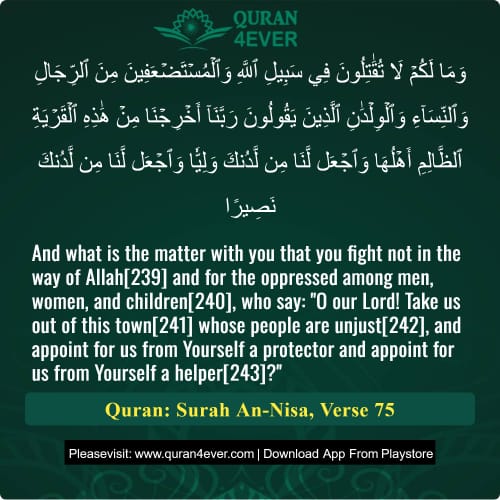
Transliteration:( Wa maa lakum laa tuqaatiloona fee sabeelil laahi walmustad'afeena minar rijaali wannisaaa'i walwildaanil lazeena yaqooloona Rabbanaaa akhrijnaa min haazihil qaryatiz zaalimi ahluhaa waj'al lanaa mil ladunka waliyanw waj'al lanaa mil ladunka naseeraa )
“And what is the matter with you that you fight not in the way of Allah [239] and for the oppressed among men, women, and children [240], who say: ‘O our Lord! Take us out of this town [241] whose people are unjust [242], and appoint for us from Yourself a protector and appoint for us from Yourself a helper [243]?’”
From “fight for the cause of Allah”, we learn that Jihad (Holy War) is an obligatory duty upon a Muslim under qualifying conditions.
One who abstains from it without a valid excuse is as sinful as one who neglects Salah.
The obligation of Jihad is based on context:
Sometimes it becomes Fard-e-Ain (individually obligatory),
Other times Fard-e-Kifayah (if some perform it, others are absolved).
This verse serves as a strong call to action against indifference when the oppressed cry for help.
We learn here that serving oppressed Muslims, even while seeking Allah’s pleasure, is not shirk (polytheism)—it is permissible and virtuous.
The command to fight is not only for divine cause, but also on behalf of the weak believers—those Muslim men, women, and children who were unable to migrate from Makkah to Madina and were being persecuted.
Their suffering justified the believers’ military support.
From this, we learn that if one is unable to freely worship Allah in a place—even if it is sacred like Makkah—then it becomes necessary to pray for an exit.
The weak Muslims in Makkah prayed to Allah to be taken out, as they couldn’t worship freely.
This shows that outward piety without true freedom to practice Islam is not favored.
It also confirms that during the rule of the four Rightly Guided Caliphs, such restrictions did not exist, and migration wasn’t required under their just leadership.
As Allah states:
“Was not Allah’s earth spacious, so that you might have migrated in it.” (Surah An-Nisa, 4:97)
The “unjust” in this verse are those tyrannical disbelievers who:
Persecuted Muslims, and
Prevented them from practicing their religion.
Merely living among non-Muslims does not make migration obligatory—the obligation arises from active oppression and persecution.
From this we learn:
When Allah is pleased with someone, He sends helpers.
When He is angry, He withholds support.
Therefore, praying for protectors and helpers is a righteous act, not shirk.
The meaning of their dua was:
“O Allah! Either take us out of Makkah or send Muslim warriors to rescue us from the tyranny of these infidels.”
Allah answered their prayer: the Muslim army conquered Makkah, and liberated the oppressed believers.
75. And what is wrong with you that you fight not in the cause of Allah, and for those weak, ill-treated and oppressed among men, women, and children, whose cry is: “Our Lord! Rescue us from this town whose people are oppressors; and raise for us from You one who will protect, and raise for us from You one who will help.” 76. Those who believe, fight in the cause of Allah, and those who disbelieve, fight in the cause of the Taghut. So fight against the friends of Shaytan; ever feeble indeed is the plot of Shaytan.
Allah encouraged His believing servants to perform Jihad in His cause and to strive hard to save the oppressed Muslims in Makkah, men, women and children who were restless because of having to remain there. This is why Allah said,
(whose cry is: “Our Lord! Rescue us from this town), referring to Makkah. In a similar Ayah, Allah said,
(And many a town, stronger than your town which has driven you out) Allah then describes this town,
(whose people are oppressors; and raise for us from You one who will protect, and raise for us from You one who will help) meaning, send protectors and helpers for us. Al-Bukhari recorded that Ibn `Abbas said, “I and my mother were from the oppressed (in Makkah).” Allah then said,
(Those who believe, fight in the cause of Allah, and those who disbelieve, fight in the cause of the Taghut. ) Therefore, the believers fight in obedience to Allah and to gain His pleasure, while the disbelievers fight in obedience to Shaytan. Allah then encourages the believers to fight His enemies,
(So fight against the friends of Shaytan; ever feeble indeed is the plot of Shaytan).
(4:75) How is it that you do not fight in the way of Allah and in support of the helpless – men, women and children -who pray: ‘Our Lord, bring us out of this land whose people are oppressors and appoint for us from Yourself, a protector, and appoint for us from Yourself a helper’?[104] .
104. This refers to those wronged, persecuted men, women and children of Makka and of the other tribes in Arabia who had embraced Islam, but were able neither to emigrate nor to protect themselves from the wrongs to which they were subjected. These helpless people suffered many forms of persecution, and prayed for deliverance from oppression.

For a faster and smoother experience,
install our mobile app now.
Related Ayat(Verses)/Topics